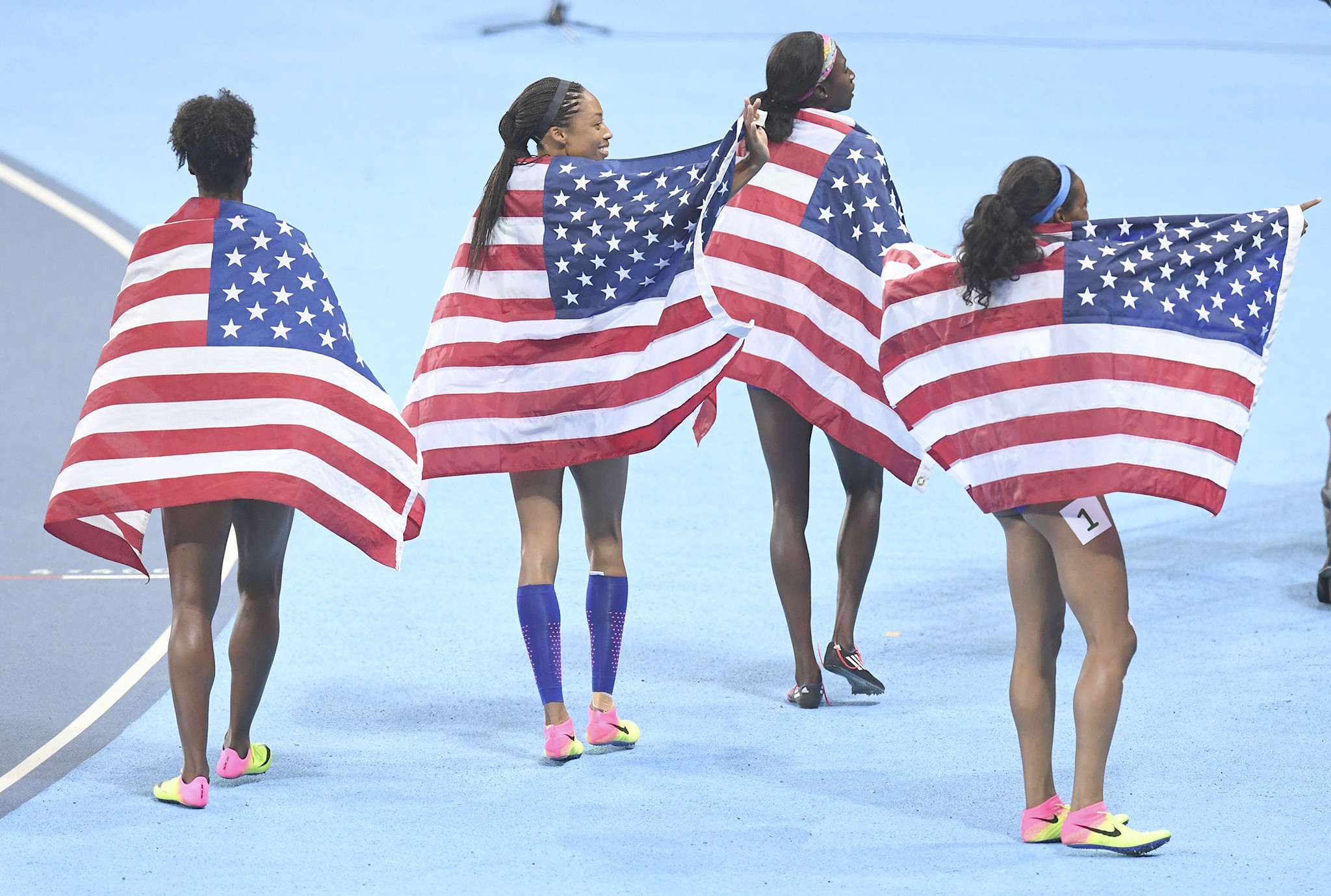RIO DE JANEIRO — A U.S. women’s team that only a day earlier appeared not to even advance to the Olympic Games’ 4×100-meter relay final, ran away with the gold medal with a 41.01 clocking Friday night at Olympic Stadium.
The U.S. team of Tianna Bartoletta, Allyson Felix, English Gardner and Tori Bowie posted the second-fastest time in history. On Thursday they appeared to be eliminated when Felix and Gardner dropped the baton on the second exchange in the prelims. But a judges panel ruled that Felix had been bumped by a Brazilian runner during the exchange. The U.S. was given a chance to qualify in a Thursday night time trial.
A Jamaican team containing Elaine Thompson and Shelly-Ann Fraser-Pryce, was second in 41.36. Britain won bronze in a national record 41.77. The U.S. win gives the 30-year-old Felix a fifth career Olympic gold medal.
Kenya’s Vivian Cheruiyot smashed the Olympic 5,000-meter record earlier Thursday night. Cheruiyot’s time of 14 minutes, 26.17 seconds, knocked more than 14 seconds off the old mark of 14:40.79 set by Romania’s Gabriela Szabo in 2000. Silver medalist Hellen Obiri of Kenya (14:29.77) and the bronze medalist Almaz Ayana of Ethiopia (14:33.59) were also under the old record.
On Thursday, it was a day of second chances.
The U.S. women’s 400-meter relay team, given a second chance to reach the Rio Olympic final after successfully appealing its disqualification from its first-round heat, got the baton around the track safely in a rerun Thursday night and earned a chance to compete for a gold medal in Friday’s final.
The team of Tianna Bartoletta, Allyson Felix, English Gardner and Morolake Akinosun had been disqualified from its heat Thursday morning after Felix was bumped by Brazil’s Kauiza Venancio and was thrown off stride, causing her to make a faulty exchange to Gardner. The baton fell and Gardner picked it up, on Felix’s urging, and they finished the race. However, they and the Brazilian teams were disqualified. USA Track and Field officials sought relief from a Jury of Appeals on the basis that Felix had been impeded; the jury agreed and granted the rerun.
The same four runners ran in the same order, but they were the only runners on the track. Their handoffs were fine and they were timed in 41.77 seconds, the top qualifying time. However, because they earned the spot in a rerun they are considered to have qualified for the final on time and will run in Lane 1 or Lane 8 instead of a prime middle lane. China, timed at 42.70 seconds — a few hundredths behind Canada — was dropped out of the field for the final.
Gardner said it felt odd to be on the track, in Lane 2, with no other runners out there.
“Honestly I feel like it was a glorified practice. We just had fun out there,” Gardner said. “We were laughing and joking going in, staying light, and that was the whole point. We already knew we were going to execute the first time—it was just that we had an unforeseen circumstance. Now, all we had to do is the same thing and the same plan that we had the first time—just get out there and absolutely execute it.”
Felix called the experience “different. It was really weird. But I think when we walked out and people were cheering for us, I think it uplifted us a little bit, encouraged us. We’re just grateful.” Felix, a seven-time Olympic medalist, also said she had never been in a situation like that. “I think that anyone who’s impeded, I think the process was fair,” Felix said.
Gardner said she wished the best of luck to the Chinese sprinters, who are now out of the final. “It’s unfortunate, what happened,” she said. “I wish that it didn’t happen this way and that we were able to basically all compete because we all worked so hard to get here and those girls worked so hard to run the relay and they missed out on the opportunity. My heart is heavy for them but the protest ruled that we were able to run off and we got the opportunity and we seized it.”


